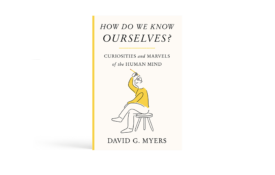-
Can’t Sleep? Try Sticking Your Head in the Freezer.
A good night’s sleep can make us more empathetic, more creative, better parents and better partners, according to Aric Prather, a psychologist at the University of California, San Francisco who treats insomnia and is the author of the new book “The Sleep Prescription.” Sleep can help us manage stress; it can make us competent and capable and better able to take on the day. But Dr. Prather says we too often view sleep as an afterthought — until we find ourselves frozen in the middle of the night, our thoughts racing, fumbling for rest or relief. Some people might reach for a supplement or sleep aid.
-

How Do We Know Ourselves? Part 1 of 3 With David Myers
Social psychologist David Myers joined APS’s Ludmila Nunes to speak about his career, his new book, and how we really do know ourselves.
-

New Content From Perspectives on Psychological Science
A sample of articles on stress responses, Qualia, sex/gender differences in verbal fluency, seeing racism as a zero-sum game, why (and when) beliefs change, and much more.
-

New Research in Psychological Science
A sample of research on positive psychological factors, the moral significance of aesthetics in nature imagery, attention, the status quo and its relationship to technology, and much more.
-
Why Taking Gender Out of the Equation Is So Difficult
It turns out a rock can tell us a lot about gender. In a recent study, Ashley Martin, an assistant professor of organizational behavior at Stanford Graduate School of Business, recruited more than 200 participants and gave each a rock. One group was asked to decorate its rocks as creatively as possible; the other was asked to anthropomorphize them with “uniquely human qualities.” (The participants were told that the rocks that received the highest ratings from a pair of judges would win $100.) People in both groups were more likely to ascribe gender to their rocks than other social categories such as race, age, or sexual orientation.
-
‘The Strength of Weak Ties’ Then and Now, Show Me Your Kale-Face, R.I.P. to Labels ‘Millennial’ and ‘Gen Z,’ and More
Oh, kale no! When I (Evan) was a kid, about five or so, I loved Popeye—the cartoon sailor man with ridiculously large forearms and a passion for spinach. In a violation of unspoken kid law, I loved spinach too. My brother Max was around one at the time, and I convinced my mom he needed to get on the Popeye diet. My mom dutifully bought a jar of the green stuff. As the spoon-turned-airplane made its approach, my brother’s face contorted, it did not have permission to land. It was the only food my brother spit out as a baby. Max would empathize with the participants of a recent study that explored the taste of leafy greens, albeit they were a bit younger.

